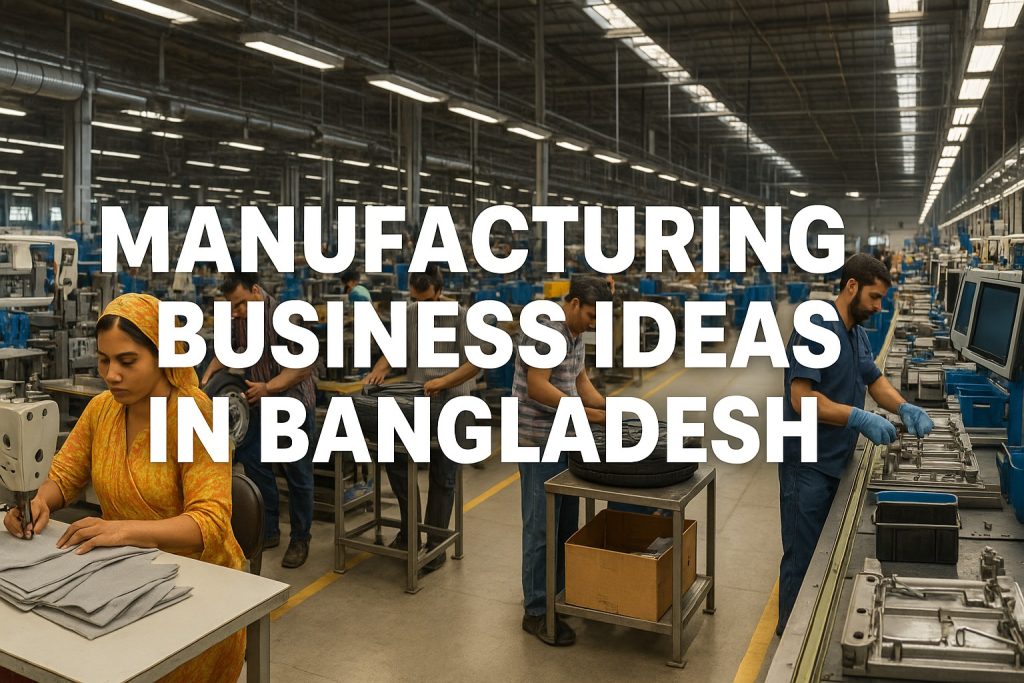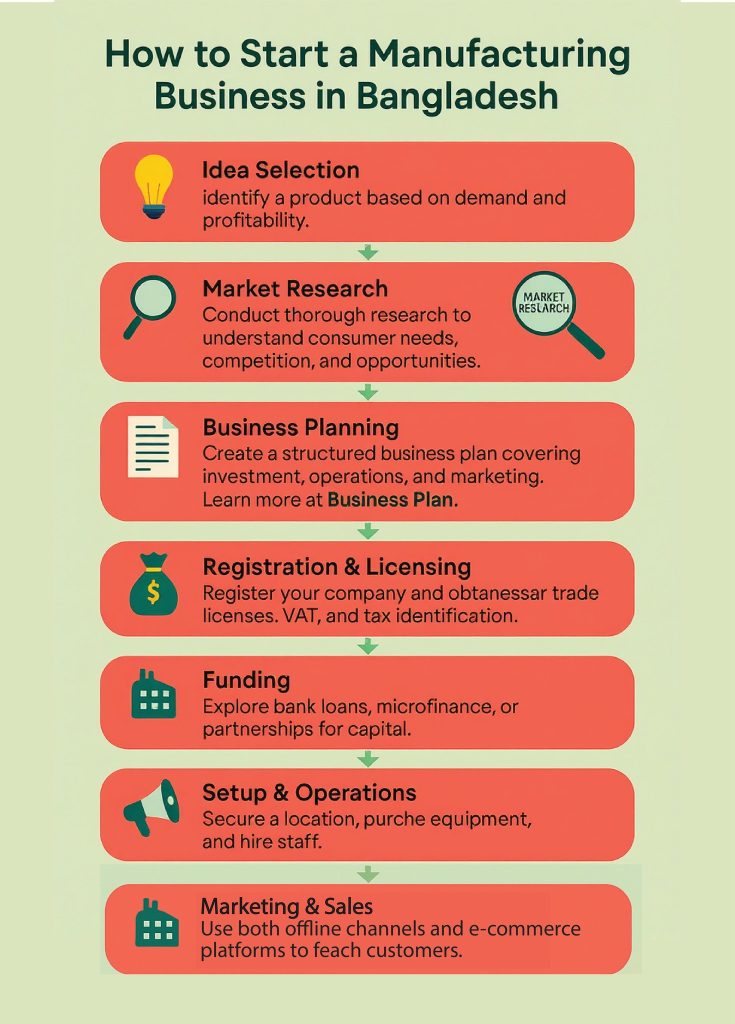Bangladesh has become one of the fastest-growing economies in South Asia, driven by consistent industrial expansion and the rise of highly scalable business sectors that are fueling sustainable growth across the nation, favorable demographics, and rising middle-class consumer base. Over the last two decades, the country has moved beyond an agriculture-dominated economy and positioned itself as a global player in textiles, garments, and other manufacturing industries. This transformation makes it one of the most attractive destinations for entrepreneurs looking to launch new ventures. Starting a manufacturing business is not only profitable but also contributes significantly to national development. For entrepreneurs who are exploring how to start a new business in Bangladesh, manufacturing offers one of the most sustainable and scalable opportunities.

The manufacturing sector has become the backbone of Bangladesh’s export earnings, with the ready-made garment industry alone contributing over 80% of foreign revenue. Beyond garments, new industries such as pharmaceuticals, electronics, plastics, food processing, and furniture are growing rapidly and creating opportunities for investors of all sizes. The global shift in supply chains, combined with competitive labor costs and government incentives, has opened doors for both small-scale entrepreneurs and large investors.
This article will explore the most promising manufacturing business ideas in Bangladesh, discuss why this sector is so important for the economy, highlight opportunities and challenges, and provide a step-by-step guide for entrepreneurs who want to venture into this space. Whether you are considering a small manufacturing business, a low-investment manufacturing in Bangladesh, or planning to scale into export-oriented industries, this guide will help you understand the possibilities and prepare for success.
Importance of Manufacturing in Bangladesh
Manufacturing is the engine that powers Bangladesh’s economy. It contributes significantly to GDP, employment, and export earnings, making it the most dynamic sector of the country. Over the last decade, Bangladesh has consistently achieved GDP growth rates of 6–7%, with manufacturing being the central driver of this momentum.
One of the most visible contributions of manufacturing is in employment generation. Millions of workers, particularly women, are employed in the ready-made garment sector, which has become a global benchmark for affordable and large-scale textile production. Beyond garments, new industries such as pharmaceuticals, plastics, ceramics, and light engineering are employing thousands of skilled and semi-skilled workers, offering career growth and reducing unemployment.
In terms of exports, Bangladesh has positioned itself as the second-largest garment exporter in the world, right after China. This dominance has not only boosted foreign currency earnings but also created a platform for diversifying into other sectors. Entrepreneurs are increasingly exploring small-scale manufacturing ventures that require less capital but offer high margins. For example, when evaluating potential industries, entrepreneurs can benefit from reviewing resources like profitable small business ideas in Bangladesh, which provide insights into sectors that align with market demand and profitability.
Bangladesh’s government has also played a key role in strengthening the manufacturing landscape. Through incentives such as tax holidays, special economic zones (SEZs), and export-friendly policies, entrepreneurs are encouraged to invest in both traditional and emerging industries. Additionally, the country’s strategic location—situated between India, China, and Southeast Asia—makes it a gateway for regional and global trade.
Another critical factor is domestic demand. With a population exceeding 170 million, Bangladesh has a large consumer market for locally produced goods. Rising urbanization, increasing disposable incomes, and a growing middle class are fueling demand for consumer products such as furniture, electronics, food, cosmetics, and more.
Thus, the manufacturing sector not only serves international markets but also meets the evolving needs of local consumers. This dual advantage makes Bangladesh an ideal environment for entrepreneurs to explore diverse manufacturing business ideas in Bangladesh, ranging from small-scale startups to large export-oriented factories.
Top 20 Manufacturing Business Ideas in Bangladesh
Bangladesh offers a wide range of opportunities for entrepreneurs in manufacturing. From traditional sectors like textiles and leather to modern industries such as electronics, pharmaceuticals, and e-commerce-based ventures, each area presents unique potential for growth. The best 20 manufacturing business ideas in Bangladesh vary in investment size, required expertise, and target markets, making it possible for both small startups and large enterprises to succeed in this fast-evolving industrial landscape.
1. Textile Manufacturing
Bangladesh is a global leader in textiles, exporting billions in garments annually. Entrepreneurs can invest in spinning, weaving, dyeing, or niche sustainable fabrics to meet both domestic and global demand. With the country’s skilled workforce and strong international market presence, textile manufacturing remains one of the best manufacturing business ideas in Bangladesh for both small and large investors.
2. Pharmaceuticals
The pharmaceutical industry is one of Bangladesh’s fastest-growing sectors, with exports to over 150 countries. Local manufacturers produce affordable medicines, generics, and specialized drugs. Entrepreneurs can enter with herbal medicines, medical supplies, or small-scale drug plants. Government policies, skilled professionals, and rising healthcare demand make pharmaceuticals a profitable small manufacturing business with excellent export potential.
3. Clothing & Fashion Houses
Beyond mass garment production, boutique fashion houses are gaining popularity. Entrepreneurs can combine manufacturing with creative design to serve both domestic middle-class consumers and international buyers. With demand for trendy, ethical, and sustainable clothing rising, fashion-focused ventures offer opportunities for branding and premium pricing, making them attractive low investment manufacturing in Bangladesh opportunities. Bangladesh hosts globally recognized clothing manufacturers delivering high-quality, cost-efficient apparel through skilled craftsmanship, large-scale production, ethical compliance, and strong export-driven supply chains.
4. Automobile Parts Manufacturing
Bangladesh’s automobile industry is expanding, creating a need for parts like tires, batteries, and accessories. Local production reduces import dependency while tapping into consistent demand. Entrepreneurs with moderate investment can establish manufacturing units catering to domestic workshops and regional exports, turning auto parts into a sustainable future of manufacturing in Bangladesh sector.
5. Electronics Manufacturing
Electronics demand is rising as more households adopt modern appliances and smartphones. Entrepreneurs can explore assembling televisions, refrigerators, or mobile accessories. Global brands are already outsourcing production to Bangladesh, creating entry points for local players. This sector offers high returns and opportunities for small manufacturing businesses focusing on affordable electronics.
6. Plastic Products
Plastic products such as household goods, packaging, and industrial containers are in constant demand. Entrepreneurs can enter with low to medium investment and expand quickly. As sustainability becomes important, producing biodegradable plastics or eco-friendly alternatives provides a competitive advantage. This makes plastics one of the most versatile manufacturing business ideas in Bangladesh.
7. Beverage Manufacturing
The beverage market is growing rapidly with bottled water, juices, and energy drinks in high demand. Entrepreneurs can innovate with flavored drinks and health-based options. The domestic youth-driven market ensures long-term growth. For deeper food and drink-related insights, explore food business ideas in Bangladesh.
8. Toy Manufacturing
Bangladesh imports most of its toys, leaving significant opportunities for local production. Entrepreneurs can manufacture affordable, safe toys targeting children and schools. With a young population and rising demand, toy manufacturing offers long-term growth. Small-scale production with innovative designs makes this an ideal low investment manufacturing in Bangladesh option.
9. Cosmetics and Personal Care
The cosmetics industry in Bangladesh is booming, fueled by rising middle-class spending and youth demand. Entrepreneurs can manufacture skincare, haircare, and beauty products using both herbal and chemical formulations. Locally produced brands are gaining trust, reducing dependency on imports. This sector allows for creative branding and export opportunities, making it one of the best manufacturing business ideas.
10. Candle Making
Candle manufacturing is a low-cost business idea with diverse markets. Candles are used for religious ceremonies, home décor, and during power outages. Entrepreneurs can start small and scale gradually, offering decorative or scented products. It is considered one of the most practical low investment manufacturing in Bangladesh ventures.
11. Pet Food Manufacturing
Pet ownership is rising in urban Bangladesh, increasing demand for packaged pet foods. Most supplies are currently imported, creating opportunities for local entrepreneurs. With small-scale processing units, one can manufacture nutritious and affordable pet food. The sector is untapped, making it a promising future of manufacturing in Bangladesh option.
12. Food & Coffee Processing
Processed food and beverages are in high demand as urban lifestyles change. Entrepreneurs can manufacture packaged snacks, baked goods, or coffee products. With Bangladesh’s growing middle class, food processing combines high profitability with scalability.
13. Furniture Manufacturing
Bangladesh’s furniture industry is growing fast, with rising demand for wooden, plastic, and steel furniture. Entrepreneurs can serve both local consumers and export markets. Affordable labor and craftsmanship provide competitive advantages. This makes furniture production one of the most profitable manufacturing business ideas in Bangladesh with excellent long-term growth.
14. Sporting Goods
Sports and fitness markets are expanding in Bangladesh. Entrepreneurs can manufacture cricket bats, footballs, gym equipment, or accessories. With both domestic demand and export opportunities, sporting goods manufacturing combines cultural relevance with profitability. It is one of the best small manufacturing businesses for entrepreneurs entering niche markets.
15. Papermaking
Paper products such as stationery, packaging, and recycled items are in constant demand. Entrepreneurs can focus on eco-friendly paper manufacturing, tapping into growing environmental awareness. Small-scale recycling plants can also serve both local markets and exports. Papermaking offers stability and sustainability, making it a practical low investment manufacturing in Bangladesh idea.
16. Chemicals and Industrial Products
The demand for chemicals like cleaning agents, adhesives, and paints is rising. Entrepreneurs can start with household or industrial products, depending on investment size. With rising industrialization, this sector provides strong domestic demand and consistent profits. Chemical production is a critical future of manufacturing in Bangladesh opportunity.
17. Agriculture & Organic Farming
Processing agricultural products like packaged rice, flour, or organic fertilizers creates value-added opportunities. Entrepreneurs can target health-conscious consumers with organic items. With Bangladesh’s agricultural base, combining farming with processing offers stability and growth. It remains one of the most sustainable small manufacturing businesses in the country.
18. Leather Goods
Bangladesh is one of the largest leather exporters globally. Entrepreneurs can manufacture footwear, belts, bags, or jackets. With strong international demand and a growing domestic market, leather remains a high-margin industry. Focusing on quality and branding ensures long-term profitability, making it a top manufacturing business idea in Bangladesh.
19. Ayurvedic & Herbal Products
Ayurvedic medicines, herbal skincare, and organic wellness products are gaining popularity worldwide. Entrepreneurs can start small-scale production using local herbs. Low investment requirements and growing demand make this a profitable niche. Herbal products also align with sustainability, giving them an edge as a best manufacturing business idea for exports.
20. E-commerce-Based Manufacturing Startups
Digital platforms have revolutionized how products reach consumers. Entrepreneurs can start small-scale manufacturing and sell directly via e-commerce. From handmade goods to industrial products, online platforms eliminate middlemen. This modern approach creates scalability and makes e-commerce-driven production a future of manufacturing in Bangladesh.
Opportunities in Manufacturing in Bangladesh
Bangladesh offers enormous opportunities in manufacturing. Export potential remains the biggest driver, with garments leading the way, but new industries like pharmaceuticals, IT-enabled manufacturing, and food processing are also showing strong export growth. The country’s demographic dividend—a young, skilled workforce—creates both a labor advantage and a growing consumer base.
Government policies such as tax holidays, low-interest loans, and the establishment of Special Economic Zones (SEZs) further enhance opportunities. Entrepreneurs can also assess market potential by understanding concepts like Total Addressable Market and Serviceable Available Market, which help evaluate both domestic and export markets for different manufacturing ventures.
Additionally, digital transformation and e-commerce platforms have made it easier for small businesses to scale quickly. A startup can begin production on a small scale and expand distribution through online channels, creating new revenue streams.
Challenges of Manufacturing in Bangladesh
While the opportunities are vast, challenges cannot be ignored. Entrepreneurs face infrastructure issues, including energy shortages, logistics inefficiencies, and port congestion. Regulatory hurdles and bureaucratic processes can delay business setup and expansion.
Bangladesh is also dependent on raw material imports for many industries, which exposes businesses to global supply chain disruptions. Competition from established players like China, India, and Vietnam also makes it difficult for new entrants to penetrate export markets.
Environmental concerns, particularly around sustainable manufacturing, are another major challenge. Industries must adopt eco-friendly practices to meet global compliance standards, which often requires additional investment.
How to Start a Manufacturing Business in Bangladesh
Starting a manufacturing venture requires careful planning and execution. Here’s a practical roadmap:

- Idea Selection – Identify a product based on demand and profitability.
- Market Research – Conduct thorough research to understand consumer needs, competition, and opportunities. For detailed guidance, see Market Research.
- Business Planning – Create a structured business plan covering investment, operations, and marketing. Learn more at how to make a Business Plan.
- Registration & Licensing – Register your company and obtain necessary trade licenses, VAT, and tax identification.
- Funding – Explore business funding likes bank loans, microfinance, or partnerships for capital.
- Setup & Operations – Secure a location, purchase equipment, and hire staff.
- Marketing & Sales – Use both offline channels and e-commerce platforms to reach customers.
Key Takeaways
Bangladesh stands at a critical juncture in its economic journey, with manufacturing at the center of its growth story. From garments to pharmaceuticals, electronics to food processing, the range of opportunities is immense. While there are undeniable challenges such as infrastructure and competition, the advantages outweigh the risks for determined entrepreneurs.
Exploring manufacturing business ideas in Bangladesh is not just about profit but also about contributing to national development, job creation, and export growth. With the right mix of innovation, research, and planning, new entrepreneurs can succeed in this dynamic sector.
Aspiring business owners should take inspiration from the wide range of possibilities and consult resources like those on starting a new business and related guides to shape their journey. The future of manufacturing in Bangladesh is promising, and those who take bold steps today may become tomorrow’s industry leaders.

